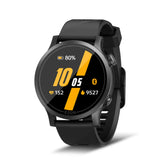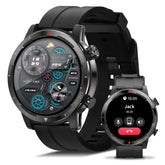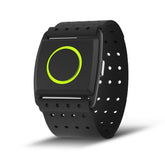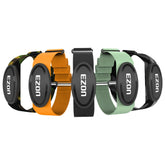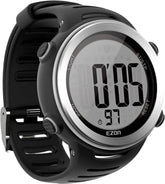Triathlon Training Blueprint: Swim, Bike, Run with Digital Precision
riathlons demand mastery of swim bike run disciplines and seamless transitions—no guesswork, only precision. This triathlon training plan combines scientific training with digital sports watch technology to optimize each segment, elevate triathlon performance, and ensure training optimization for beginners and seasoned athletes alike. Let data be your coach, and turn every session into a step toward the finish line.
1. The Triathlete’s Toolkit: How a Digital Sports Watch Elevates Training
A. Multi-Sport Mode: Auto-Detect & Transition Seamlessly
- Swim to Bike Transition (T1): Your watch detects when you exit the water, pauses swim tracking, and auto-starts bike mode—no manual input needed (e.g., EZON GPS Series).
- Real-Time Data Overlays: View pace (run), cadence (bike), and stroke rate (swim) on a single screen during workouts.
B. Performance Metrics for Each Discipline
| Discipline | Key Metrics Tracked | Training Impact |
|---|---|---|
| Swim | Stroke count, distance per stroke, SWOLF score | Improve efficiency; reduce energy waste |
| Bike | Power (if paired with sensors), cadence, speed | Optimize gear usage; maintain steady effort |
| Run | Stride length, vertical oscillation, heart rate | Refine form; avoid overstriding |
C. Recovery & Overtraining Alerts
- Training Load Analysis: Cumulative stress score helps balance swim/bike/run volume—ideal for avoiding burnout.
- HRV (Heart Rate Variability): Low HRV signals the need for rest; use guided breathing exercises on your watch to lower stress.
2. Discipline-Specific Training: Swim, Bike, Run with Purpose
A. Swim: Efficiency Over Distance
Technique Drills
- Catch-Up Drill: 4x50m with 2-second pause between strokes—use your watch to count strokes per length (aim for <30 strokes/50m in freestyle).
- Open Water Practice: Activate GPS to simulate race conditions; track sighting frequency (every 6–8 strokes for optimal navigation).
Sample Weekly Plan
- Technique Day: 2000m swim with focus on SWOLF score (lower score = better efficiency).
- Endurance Day: 3000m steady swim at 70% max heart rate—use a digital sports watch to maintain consistent pace.
B. Bike: Power, Pedal, and Pace
Interval Training
- Sweet Spot Intervals: 3x20 minutes at 88–94% FTP (Functional Threshold Power)—pair with a power meter for precision.
- Hill Repeats: 6x5-minute climbs at 110% FTP; use your watch to log elevation gain and average gradient.
Transition Practice
- Brick Workouts: 1-hour bike + 30-minute run; your watch auto-logs both activities and calculates transition time (aim to shave 30 seconds off T2).
C. Run: Stride Smart, Finish Strong
Pace Training
- Tempo Runs: 4x10 minutes at race goal pace (e.g., 4:30/km for Olympic distance); set vibration alerts if you drift off pace.
- Negative Splits: Program your watch to notify when the second half of a run is slower than the first—correct by increasing cadence.
Post-Bike Run Drills
- Jelly Legs Acclimation: 10-minute easy run off the bike 2x/week; track heart rate recovery to ensure you’re ready for race-day efforts.
3. Training Optimization: Balance, Intensity, and Recovery
A. Weekly Volume Breakdown (Olympic Distance Focus)
| Discipline | Weekly Hours | Intensity Distribution | Key Focus |
|---|---|---|---|
| Swim | 3–4 | 50% technique, 30% endurance | Stroke efficiency |
| Bike | 5–6 | 40% threshold, 30% hill work | Power output consistency |
| Run | 4–5 | 40% tempo, 20% interval | Stride stability |
| Recovery | 2–3 | Yoga, foam rolling, walking | HRV optimization |
B. Periodization: 16-Week Plan
Base Phase (Weeks 1–4)
- Goal: Build aerobic base; 80% of sessions in Zone 2 (60–70% max heart rate).
- Digital Tool: Use your watch’s calendar to schedule equal time for each discipline.
Intensity Phase (Weeks 5–10)
- Goal: Introduce threshold workouts; track training load to avoid exceeding 10% weekly increase.
- Key Metric: Monitor TSS (Training Stress Score) to ensure balanced stress across swim/bike/run.
Peak & Taper (Weeks 11–16)
- Goal: Simulate race conditions; 1x/week brick workout at race pace.
- Recovery Focus: Use your watch’s sleep tracking to ensure 7–9 hours/night, critical for peak performance.
4. Race-Day Strategy: Execute with Precision
A. Swim Start
- Positioning: Line up on the outer edge; use your watch’s compass to sight buoys accurately—no more off-course detours.
B. Bike Leg
- Fueling Alerts: Program nutrition reminders (e.g., 1 gel every 45 minutes) to avoid bonking—sync with your digital sports watch.
Run Leg
- Pace Lock: Set your goal pace (e.g., 5:00/km) and let the watch vibrate if you’re too fast/slow—preserve energy for the final 5K surge.
Transitions
- Practice Drills: 10-minute T1/T2 simulations at home; use your watch to time transitions—aim for sub-90 seconds for T1, sub-60 seconds for T2.
5. Gear Recommendations: Tools for the Triathlete
A. Digital Sports Watch Essentials
- Multi-Band GPS: EZON GPS Series for accurate tracking in urban canyons and dense forests.
- Long Battery Life: 40+ hours in multi-sport mode—no mid-race charging for Ironman-distance events.
- Water Resistance: 10ATM rating for open-water swims; anti-fog display for clear data in all conditions.
B. Discipline-Specific Gear
- Swim: Wetsuit with built-in buoyancy for faster transitions; mirrored goggles for sun protection.
- Bike: Aero helmet and clipless pedals to reduce drag; frame-mounted computer for real-time power data.
- Run: Lightweight race shoes with quick-lace systems for rapid T2 transitions.
6. Common Pitfalls to Avoid
- Overtraining the Swim: Focus on technique over distance—poor form increases energy 消耗 by 20%.
- Ignoring Transitions: 1 minute saved in T1/T2 can boost your race rank by 5–10 positions.
- Inconsistent Fueling: Use your watch’s alerts to practice nutrition in every brick workout—no surprises on race day.
Train Like a Pro, Race Like a Champion
With a strategic triathlon training plan, a digital sports watch as your data hub, and a focus on training optimization, you’ll transform raw effort into refined performance. Let every swim stroke, pedal revolution, and running stride be guided by precision, not guesswork.
The triathlon course is a puzzle—solve it with data, discipline, and the right tools. Gear up, train smart, and step to the start line confident in your preparation. The finish line isn’t just a goal; it’s a celebration of the science, strategy, and sweat you’ve invested. Now go crush that swim, dominate the bike, and run like the data says you can.
EZON Watch: Professional sports technology brand
https://ezonwatch.com
https://ezonwatch.com
